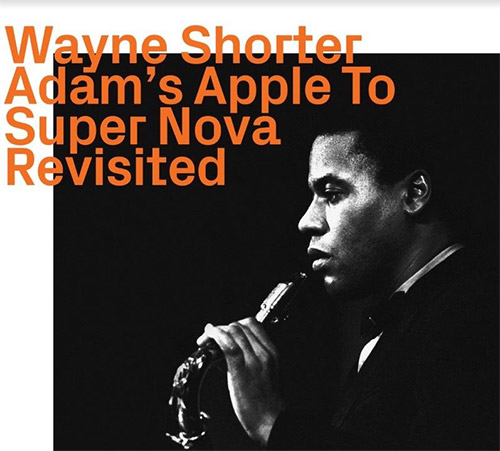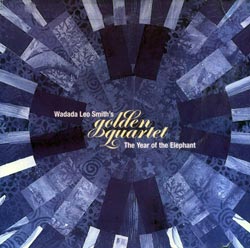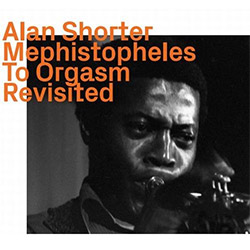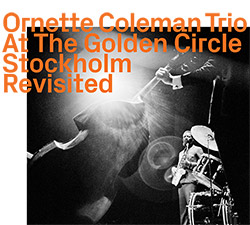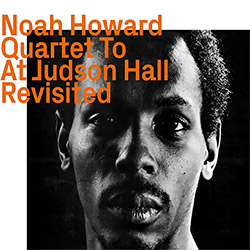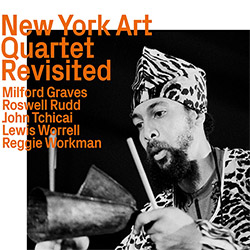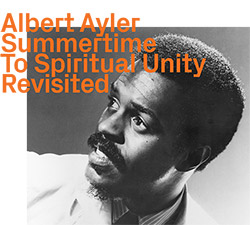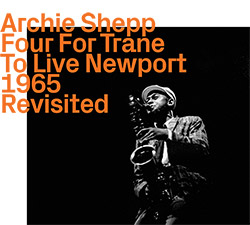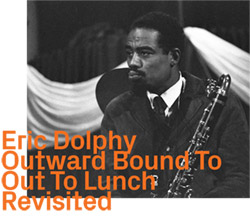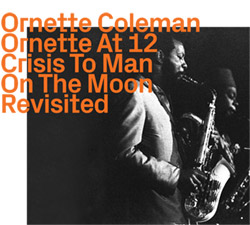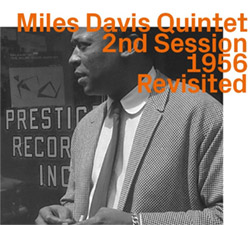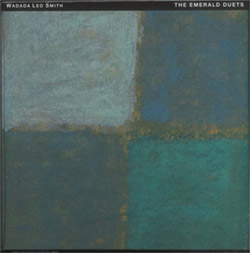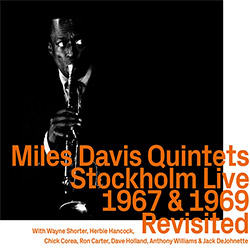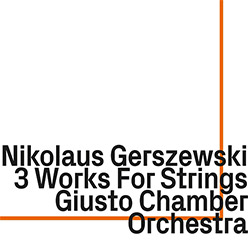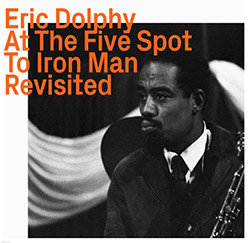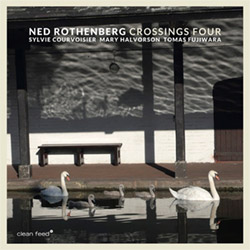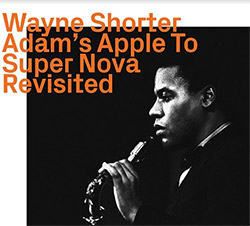
Following the evolution in form and approach of composer and tenor saxophonist Wayne Shorter from his 1966 Blue Note album Adam's Apple with Hancock, Workman and Chambers (including a pre-Miles "Footprints") to the 1969 Weather Report precursor Super Nova with John McLaughlin, Sonny Sharock, Miroslav Vitous, Chick Corea, and Jack DeJohnette.
In Stock
Quantity in Basket: None
Log In to use our Wish List
Shipping Weight: 2.00 units
Sample The Album:
Wayne Shorter-soprano saxophone
John McLaughlin-guitar
Sonny Sharock-guitar
Walter Booker-guitar
Miroslav Vitous-double bass
Jack DeJohnette-drums, african thumb piano
Chick Corea-drums, vibes
Airto Moreira-percussion
Mario Booker-vocal
Click an artist name above to see in-stock items for that artist.
UPC: 752156115328
Label: ezz-thetics by Hat Hut Records Ltd
Catalog ID: ezz-thetics 1153
Squidco Product Code: 33266
Format: CD
Condition: New
Released: 2023
Country: Switzerland
Packaging: Cardboard Gatefold
Tracks 1-6 recorded at Van Gelder Studio, in Englewood Cliffs, New Jersey, on February 3rd and 4th, 1966. Tracks 7-12 recorded at A& R Studios, in NYC, on August 29th and September 2nd, 1969, by Wayne Shorter.
Adam's Apple orignially released in 1966 as a vinyl LP on the Blue Note label with catalog code BST 84232.
Super Nova originally released in 1969 as a vinyl LP on the Blue Note label with catalog code BST 84332.
"Sixty years can obscure, even overwrite, what was initially daring about a composition. Wayne Shorter's extraordinary output in the mid-1960s is the case in point, as his vocabulary and syntax have been thoroughly embedded into common usage over the decades. Shorter's daring was against the grain in a period where conventions were constantly trampled, as he subtly stretched standard forms to frame sticky themes, the kind listeners soon knew by heart. Shorter's initial quintet and quartet albums for Blue Note are stuffed with them.
Recorded over two sessions in February 1966, Adam's Apple includes the first recording of "Footprints," which, in addition to now being Shorter's most famous composition, exemplifies the adhesive quality of his writing. The theme is draped over minor blues changes to languorous effect, unruffled by metric modulation and a harmonically unconventional turnaround. Although it is overshadowed by the more forward-leaning treatment included on Miles Smiles (recorded eight months later, it nevertheless hit the street before Adam's Apple), Shorter's original approach to the composition aligns it with "Night Dreamer" and "Witch Hunt," memorable mid-tempo opening tracks from his earlier Blue Notes.
Blue Note apparently did not fully understand what they had in "Footprints," as they placed it on the B side of the original LP. While it is the epitome of Shorter's slyness in molding commonly used devices into nuanced, sophisticated themes, the album includes other notable examples of this characteristic of Shorter's compositional style. The title piece was built on a stock soul jazz chassis, while "El Gaucho" tapped a contemporary Latin tinge; yet, both pieces reflect Shorter's finesse in making kernels of melody suddenly bloom, elevating his themes far above the generic.
Shorter's tenor sound played a vital role in this regard, as he often projected both gravity and loft in a single phrase. Though he launched pyrotechnics at strategic points in his solos, Shorter relied more on a keening timbre to propel the streamlined "Chief Crazy Horse," and a gauzy tone to wrap about the balladic contours of "Teru." Shorter is often at his most affecting when he was ruminative and emotionally ambiguous; on his take of Jimmy Rowles' "502 Blues (Drinkin' and Drivin')," he sublimely blurred worldliness and world-weariness. Throughout Adam's Apple, the melding of Shorter's sound and materials makes for compelling listening.
Shorter's music radically changed course over the next three and a half years, the impetus for which can be summarized with a single word: Miles. Compositionally, Shorter adopted to Davis's increasingly expansive and abstract approach, his evocative themes punctuating the trumpeter's soundscapes. By 1969, Shorter also played soprano as frequently as he did tenor, developing a vocabulary of cries and cascades with a piquant tone that increasingly became the template for successive generations of players.
Super Nova was the first Shorter-led album to reflect these changes. While there are connections to his work with Davis - the inclusion of John McLaughlin and three compositions previously recorded with the trumpeter's quintet and issued on Water Babies in 1976 - the album is neither a summation of Shorter's work with Davis, nor can it be tidily considered a precursor to Weather Report, despite Miroslav Vitous' presence. It documents Shorter striking out on his own in the largely uncharted new world of what would soon be called fusion.
Unlike his prior albums, which are impeccable in terms of sequencing, track length, and solo order, Super Nova has a loose, almost ad hoc feel. Shorter had not previously opened an album with such an explosive performance as the title track, one that has the feel of a clip extracted from a longer take. The onslaught of Vitous, McLaughlin, Sonny Sharrock, and the percussion section of Chick Corea, Jack DeJohnette, and Airto Moriera, rivals anything Davis produced before his late-1970s hiatus.
Although "Swee-Pea" reduces the temperature and reiterates the thematic basis of Shorter's music, the swirl of acoustic and electric strings and vibraphone, highlighted by the swells of malleted drums and cymbals and the tinkling of small metal percussion, indicated that Shorter was making wholesale changes to his approach. This idea is reinforced by ending the A side with "Dindi;" bookended by exhilarating Carnivalesque jams, the poignant reading of the Jobim classic reflected Shorter's emergent interest in Brazilian music, which led to his influential 1974 collaboration with Milton Nascimento, Native Dancer.
Like "Swee-Pea," "Water Babies" and "Capricorn" were originally recorded by Davis' quintet during the sessions that yielded Nefertiti. While the thematic materials are easily recognized in the newer versions, the screeches of the guitars, the rumbling of the bass, and, particularly, the thunderous drums at the end of "Capricorn," stress-test the compositions in ways unforeseen two years before. However, they do not have the shock value of "More Than Human," which closes the album much the way it began, with shards of sound flying in every direction, eventually fading over the horizon like a tornado.
There is no straight line between Adam's Apple and Super Nova. The list of differences between the two albums is long, unsurprising given the radically changing times, when modernist jazz conventions were refracted into new spectra of sounds. However, they share the singular voice of Wayne Shorter, who, within the span of three years, significantly reshaped what was daring in jazz, and would continue to do so throughout the next three years with Weather Report."-Bill Shoemaker, March 2023

The Squid's Ear!
Artist Biographies
• Show Bio for Wayne Shorter "Wayne Shorter (born August 25, 1933) is an American jazz saxophonist and composer. Shorter came to prominence in the late 1950s as a member of, and eventually primary composer for, Art Blakey's Jazz Messengers. In the 1960s, he joined Miles Davis's Second Great Quintet, and then co-founded the jazz fusion band Weather Report. He has recorded over 20 albums as a bandleader. Many Shorter compositions have become jazz standards, and his music has earned worldwide recognition, critical praise and commendation. Shorter has won 11 Grammy Awards. He is acclaimed for his mastery of the soprano saxophone since switching his focus from the tenor in the late 1960s and beginning an extended reign in 1970 as Down Beat's annual poll-winner on that instrument, winning the critics' poll for 10 consecutive years and the readers' for 18. The New York Times' Ben Ratliff described Shorter in 2008 as "probably jazz's greatest living small-group composer and a contender for greatest living improviser". In 2017, he was awarded the Polar Music Prize." ^ Hide Bio for Wayne Shorter • Show Bio for John McLaughlin "John McLaughlin (born 4 January 1942), also known as Mahavishnu, is an English guitarist, bandleader, and composer. A pioneer of jazz fusion, his music combines elements of jazz with rock, world music, Indian classical music, Western classical music, flamenco, and blues. After contributing to several key British groups of the early 1960s, McLaughlin made Extrapolation, his first album as a bandleader, in 1969. He then moved to the U.S., where he played with drummer Tony Williams's group Lifetime and then with Miles Davis on his electric jazz fusion albums In a Silent Way, Bitches Brew, Jack Johnson, Live-Evil, and On the Corner. His 1970s electric band, the Mahavishnu Orchestra, performed a technically virtuosic and complex style of music that fused electric jazz and rock with Indian influences. McLaughlin's solo on "Miles Beyond" from his album Live at Ronnie Scott's won the 2018 Grammy Award for the Best Improvised Jazz Solo. He has been awarded multiple "Guitarist of the Year" and "Best Jazz Guitarist" awards from magazines such as DownBeat and Guitar Player based on reader polls. In 2003, he was ranked 49th in Rolling Stone magazine's list of the "100 Greatest Guitarists of All Time". In 2009, DownBeat included McLaughlin in its unranked list of "75 Great Guitarists", in the "Modern Jazz Maestros" category. In 2012, Guitar World magazine ranked him 63rd on its top 100 list. In 2010, Jeff Beck called McLaughlin "the best guitarist alive", and Pat Metheny has also described him as the world's greatest guitarist. In 2017, McLaughlin was awarded an honorary doctorate of music from Berklee College of Music." ^ Hide Bio for John McLaughlin • Show Bio for Walter Booker "Walter Booker (December 17, 1933 - November 24, 2006) was an American jazz musician. A native of Prairie View, Texas, Booker was a reliable bass player and an underrated stylist. His playing was marked by voice-like inflections, glissandos and tremolo techniques. Booker moved with his family to Washington, D.C. in the mid-1940s. He played clarinet and alto sax in college with a concert band. In 1959 he began on bass while in the US Army while serving in the same unit as Elvis Presley. He worked with Andrew White in Washington after his discharge, playing in the JFK Quintet during the early 1960s. In 1964 Booker moved to New York City, being hired by Donald Byrd. After that, he recorded and toured with Ray Bryant, Betty Carter, Chick Corea, Stan Getz, Art Farmer, Milt Jackson, Thelonious Monk and Sonny Rollins, before joining the Cannonball Adderley Quintet in 1969, starting an association which lasted until Adderley's death in 1975. He then toured the United States with the Shirley Horn Trio, along with Billy Hart on drums. During the same time, Booker designed, built, and ran the Boogie Woogie Studio in NYC, a mecca for musicians from all over the world, and through the 1980s, he played and recorded with Nat Adderley, Nick Brignola, Arnett Cobb, Richie Cole, John Hicks, Billy Higgins, Clifford Jordan, Pharoah Sanders, Sarah Vaughan, and Phil Woods. Booker was married to the pianist Bertha Hope with whom he played in a trio that included drummer Jimmy Cobb. Booker died in his Manhattan, New York home on November 24, 2006, at the age of 72." ^ Hide Bio for Walter Booker • Show Bio for Miroslav Vitous "Many gifted musicians start playing at an early age, and Vitous began playing the violin at the age of six. He subsequently played the piano at age 10, before settling on the bass at 14. He studied under F. Posta at the Prague Conservatory in Czechoslovakia. The history of the conservatory is fascinating, with noteables such as Antonín Dvorák serving as their director. The conservatory has a very disciplined program requiring all students to study for 6 years and pass stringent exams. During this time he played in a trio with his brother Alan, and Jan Hammer. After winning a scholarship to the Berklee College of Music in Boston, he came to the U.S. A year later in 1966, Miroslav moved to New York & collaborated with musicians such as Bob Brookmeyer, Chick Corea, Miles Davis, Art Farmer, Stan Getz, Charlie Mariano, and Herbie Mann. In 1970, the group Weather Report was formed along with Wayne Shorter and Joe Zawinul. Three years later, he formed the Miroslav Vitous Group along with John Surman, Kenny Kirkland and Jon Christensen. In 1979, Vitous became the director of the Jazz Department at the New England Conservatory in Boston. We will explore more of his teaching experience under the educator section. In 1982, Vitous reunites Chick Corea and Roy Haynes and tours the world, and produces 2 albums under the ECM label. There were several performances at the Pittsburg Symphony Orchestra and at Music of Viva in Boston. In 1988, he removed himself from academia in order to focus all his energy on composing and performing. Around this time, he returned to Prague and recorded an album with his brother. Miroslav Vitous has performed in several concerts and festivals around Europe. This touches the surface in exploring Vitous' musical experience, and there's more to be found under the musician section. Enjoy learning about Miroslav Vitous, the bass player, educator, composer, arranger and producer." ^ Hide Bio for Miroslav Vitous • Show Bio for Jack DeJohnette "Jack DeJohnette (born August 9, 1942) is an American jazz drummer, pianist, and composer. An important figure of the fusion era of jazz, DeJohnette is one of the most influential jazz drummers of the 20th century, given his extensive work as leader and sideman for musicians including Charles Lloyd, Freddie Hubbard, Keith Jarrett, Bill Evans, John Abercrombie, Alice Coltrane, Sonny Rollins, Miles Davis, Joe Henderson, Michael Brecker, Herbie Hancock and John Scofield. He was inducted into the Modern Drummer Hall of Fame in 2007." ^ Hide Bio for Jack DeJohnette • Show Bio for Chick Corea "Armando Anthony "Chick" Corea (June 12, 1941 - February 9, 2021) was an American jazz composer, pianist, keyboardist, bandleader, and occasional percussionist. His compositions "Spain", "500 Miles High", "La Fiesta", "Armando's Rhumba", and "Windows" are widely considered jazz standards. As a member of Miles Davis's band in the late 1960s, he participated in the birth of jazz fusion. In the 1970s he formed Return to Forever. Along with McCoy Tyner, Herbie Hancock, and Keith Jarrett, Corea is considered to have been one of the foremost jazz pianists of the post-John Coltrane era. Corea continued to collaborate frequently while exploring different musical styles throughout the 1980s and 1990s. He won 27 Grammy Awards and was nominated more than 70 times for the award. [...]" ^ Hide Bio for Chick Corea • Show Bio for Airto Moreira "Airto Guimorvan Moreira (born August 5, 1941) is a Brazilian jazz drummer and percussionist. He is married to jazz singer Flora Purim, and their daughter Diana Moreira is also a singer. Coming to prominence in the late 1960s as a member of the Brazilian ensemble Quarteto Novo, he moved to the United States and worked in jazz fusion with Miles Davis and Return to Forever. Airto Moreira was born in Itaiópolis, Brazil, into a family of folk healers, and raised in Curitiba and São Paulo. Showing an extraordinary talent for music at a young age, he became a professional musician at age 13, noticed first as a member of the samba jazz pioneers Sambalanço Trio and for his landmark recording with Hermeto Pascoal in Quarteto Novo in 1967. Shortly after, he followed his wife Flora Purim to the United States. After moving to the US, Moreira studied with Moacir Santos in Los Angeles. He then moved to New York where he began playing regularly with jazz musicians, including the bassist Walter Booker. Through Booker, Moreira began playing with Joe Zawinul, who in turn introduced him to Miles Davis. At this time Davis was experimenting with electronic instruments and rock and funk rhythms, a form which would soon come to be called jazz fusion. Moreira was to participate in several of the most important projects of this emerging musical form. He stayed with Davis for about two years. Shortly after leaving Davis, Moreira joined other Davis alumni Zawinul, Wayne Shorter and Miroslav Vitous in their group Weather Report, playing percussion on their first album (1971). He left Weather Report (replaced by Dom Um Romão and Muruga Booker for their Sweetnighter album) to join fellow Davis alumnus Chick Corea's new band Return to Forever. He played drums on Return to Forever's first two albums: Return to Forever and Light as a Feather in 1972. Moreira was a contributor to many of Grateful Dead percussionist Mickey Hart's world music/percussion albums in Rykodisc's The World collection, including The Apocalypse Now Sessions, Däfos, Supralingua, and Planet Drum, which won a World Music Grammy in 1991. He can be heard playing congas on Eumir Deodato's 1970s space-funk hit "Also sprach Zarathustra" on the album Prelude. Moreira has played with many of the greatest names in jazz including Cannonball Adderley, Lee Morgan, Paul Desmond, Dave Holland, Jack DeJohnette, John McLaughlin, Keith Jarrett, Al Di Meola, Zakir Hussain, George Duke and Mickey Hart. In addition to jazz concerts and recordings, he has composed and contributed music to film and television (including scores for Apocalypse Now and Last Tango in Paris), played at the re-opening of the Library of Alexandria, Egypt (along with fellow professor of ethnomusicology Halim El-Dabh), and taught at UCLA and the California Brazil Camp. In 1996, Moreira and his wife Flora Purim collaborated with P.M. Dawn on the song "Non-Fiction Burning" for the AIDS benefit album Red Hot + Rio, produced by the Red Hot Organization." ^ Hide Bio for Airto Moreira
4/10/2024
Have a better biography or biography source? Please Contact Us so that we can update this biography.
4/10/2024
Have a better biography or biography source? Please Contact Us so that we can update this biography.
4/10/2024
Have a better biography or biography source? Please Contact Us so that we can update this biography.
4/10/2024
Have a better biography or biography source? Please Contact Us so that we can update this biography.
4/10/2024
Have a better biography or biography source? Please Contact Us so that we can update this biography.
4/10/2024
Have a better biography or biography source? Please Contact Us so that we can update this biography.
4/10/2024
Have a better biography or biography source? Please Contact Us so that we can update this biography.
Track Listing:
1. Adam's Apple 6:48
2. 502 Blues (Drinkin' And Drivin') 6:35
3. El Gaucho 6:32
4. Foot Prints 7:30
5. Teru 6:13
6. Chief Crazy Horse 7:34
7. Super Nova 4:52
8. Swee-Pea 4:37
9. Dindl 9:36
10. Water Babies 4:55
11. Capricorn 7:48
12. More Then Human 6:09
Hat Art
Improvised Music
Jazz
Free Improvisation
NY Downtown & Metropolitan Jazz/Improv
Jazz Reissues
Quartet Recordings
Large Ensembles
Staff Picks & Recommended Items
New in Improvised Music
Search for other titles on the label:
ezz-thetics by Hat Hut Records Ltd.

